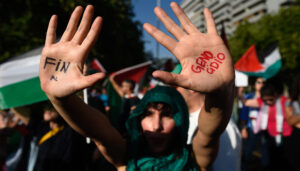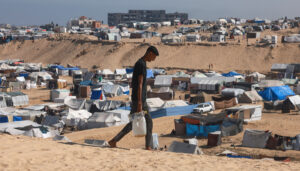Written By: Wendy Merdian
March holds one of my favorite holidays, ‘Mothers Day’. My children have been whispering little hints of the projects they have been making, precious creations of crayon, glitter, glue-stick and stickers. My husband will present me with a nice gift for the kitchen to make my job there easier or prettier. I will never forget a ‘Mothers Day Gift’ I was given one year by a friend: a week’s work of ‘maid service’. It seemed like a dream come true in those foggy, fuzzy days of pregnancy, non-sleeping babies and busy toddlers.
 But by the end of that week, I was more exhausted from having a stranger in the house than the house-keeping. She didn’t speak any of the languages I spoke, had a different definition of ‘clean’, and a VERY different concept about child-care! I found it very strange to have someone hovering all the time; I knew that was what she was supposed to do, but as someone who likes family time to be just family, I found it intrusive and almost more work as I had to put things away faster than she did or I would never find them again!
But by the end of that week, I was more exhausted from having a stranger in the house than the house-keeping. She didn’t speak any of the languages I spoke, had a different definition of ‘clean’, and a VERY different concept about child-care! I found it very strange to have someone hovering all the time; I knew that was what she was supposed to do, but as someone who likes family time to be just family, I found it intrusive and almost more work as I had to put things away faster than she did or I would never find them again!
I tried to bring her into the family circle, but without a language in common, it was hard. When I forced her to eat with us, she was visibly uncomfortable. When one of my little ones, who was just learning to clean up his toys, said: “Why should I if Maria is here?” I realized this was counter productive and I could never be the ‘live-in type’. I was the Mistress of My Domain, and just not cut out to have another woman be a part of it every day. We would be a messier, but happier family with ‘help’ once a week.
Another key to our once-a-week helper working so well is that we were not ‘like family’. It was a friendly business arrangement. We had clear expectations for a results-based employee/employer relationship where she went home to her own house and life. In their book “Global Woman: Nannies, Maids and Sex Workers in the New Economy”, Barbara Ehrenreich and Arlie Russell Hochschild mentioned a Filipina domestic worker lamenting: “to be considered ‘family’ is the kiss of death for us”. For them, it means expectations of more work, but none of the benefits. One of the benefits given many Jordanian families is the ‘protection’ that would be given to a daughter, but to their helper, is feels like prison. “Global Woman” is a must-read for any Jordanian woman with or considering live-in help, to see what life and choices are like for powerless women. To balance the seriousness of the situation with a little humor, make sure to see “Nanny Diaries”, too.
In light of the recent controversies over trash-can babies, the abuses and even deaths of Asian domestic workers, and the frustrations of Jordanian women with live-in-helper horror stories, I had hoped to write about two friends who were excellent examples of making a live-in domestic worker work for a family.
Sadly, both domestic workers broke the trust of their employers. Both were caught having affairs with men. It is easy to condemn their immorality, to add them to the list of stories we rehearse at children’s birthday parties at Jungle Bungle that solidify their bad reputation. The bad rep given makes it easier for us to harden our hearts to their situations, when in fact many of them are mothers themselves, who left their children with grandmothers in order to provide them with food and education. How sad that their only hope for their children to succeed in their country is to let someone else raise them. Then they come here and raise our children so we can work, to provide our children with ‘the best’. Something isn’t right with this picture: two families of children, growing up with someone other than their mother as their primary care-giver.
It seems the nicest, most trusting and kind Jordanians get the most immoral and deceptive domestic workers. If these women come here to work, they need to learn to live within the boundaries of the culture. It also seems like the kindest and most hard-working domestics get the most abusive and cruel ‘madams’. A recent JO magazine article mentioned that the rate of physical abuse of domestic workers is realistically about one in ten. What a dichotomy. This polarization only widens the divide between madam and maid, and strengthens unfair xenophobic tendencies in both women. We women need to stick together in this world, both we who could abuse our position of power, and those who are subversive under it’s’ control.
I think many local families are becoming more aware and doing well at providing for the needs of their workers. Waleed Khamis, a young Jordanian blogger, tells of his ‘wake-up’ call when looking for a new domestic worker:
I went with my mom today to look at the new applications arrived at a maids office to pick our choice.
Skimming through them, a normal conversation would question their experiences and language(s) they are able to speak… Instead of that me and mom were discussing their issues and addressing them like the widow with three children, the single 34 years old… the married with two children…
It made me feel so sad just looking through them, another customer was there and a look of surprise was on his face… It’s weird how we can easily shut our feelings off.
I thought of that widow with three children, she has no experience. She has to work after the death of her husband… she is 37 years old, speaks neither Arabic nor English, she is leaving her kids in a not-known-end adventure. Allah e3eenhom.
The Indonesian 24 years old we have, after 3 years of staying at our place… She opened up and told me how many of her friends who served in Saudi got pregnant or were molested by the “acting religious” fathers there… My assumption is that MOST of the maids there get such treatment.
All of that is for 3.5 JDz a day, I really wonder if it is really worth it.
When thinking of this I always close the subject by re-convincing myself that this amount of money they take is enough and worth it.
But is it?!
Waleed is one who will be honoring another mother living in his home on Mother’s Day, and validating her role (and pain) as mother to unseen children as well as her service to his family. May his kind increase.










